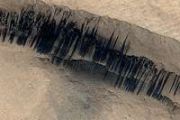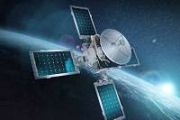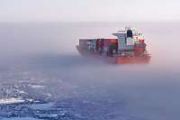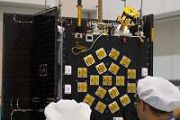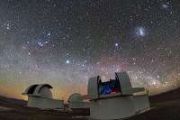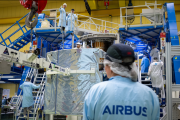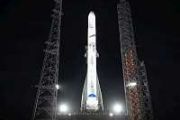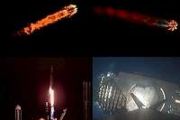
Copernical Team
Curiosity's Encore Journey Along Upper Gediz Vallis Ridge
 If the Curiosity rover had a song stuck in her head today, she might be humming "Back to the uGVR," to the tune of The Beatles "Back in the U.S.S.R," as she drives south along the eastern edge of the upper Gediz Vallis Ridge (uGVR).
The rover drove up to the uGVR last summer and investigated several rocks; now with the beautiful "Fascination Turret" section of the uGVR in sight, the team i
If the Curiosity rover had a song stuck in her head today, she might be humming "Back to the uGVR," to the tune of The Beatles "Back in the U.S.S.R," as she drives south along the eastern edge of the upper Gediz Vallis Ridge (uGVR).
The rover drove up to the uGVR last summer and investigated several rocks; now with the beautiful "Fascination Turret" section of the uGVR in sight, the team i ISRO's RLV-LEX-02 Mission: A Leap Forward in Autonomous Space Vehicle Landing
 In a significant advancement for reusable launch vehicle technology, ISRO successfully conducted the RLV Landing Experiment (LEX-02), marking a milestone in the autonomous landing capabilities of space-returning vehicles. This experiment, carried out at the Aeronautical Test Range in Karnataka, demonstrated the vehicle's ability to autonomously correct its trajectory and land precisely on a runw
In a significant advancement for reusable launch vehicle technology, ISRO successfully conducted the RLV Landing Experiment (LEX-02), marking a milestone in the autonomous landing capabilities of space-returning vehicles. This experiment, carried out at the Aeronautical Test Range in Karnataka, demonstrated the vehicle's ability to autonomously correct its trajectory and land precisely on a runw Artemis IV Mission Advances with Completion of SLS Payload Adapter Testing
 The Space Launch System (SLS) has achieved a significant milestone towards the Artemis IV mission with the readiness of its payload adapter for testing, signifying a major step for the mission's success. This adapter, critical for connecting the spacecraft to the rocket, has evolved from the design used in the first three Artemis missions and is now ready for structural evaluation.
Constru
The Space Launch System (SLS) has achieved a significant milestone towards the Artemis IV mission with the readiness of its payload adapter for testing, signifying a major step for the mission's success. This adapter, critical for connecting the spacecraft to the rocket, has evolved from the design used in the first three Artemis missions and is now ready for structural evaluation.
Constru Artemis II's Orion Spacecraft to Undergo Critical Manual Handling Test
 In an upcoming landmark mission, astronauts aboard NASA's Orion spacecraft will engage in a first-of-its-kind test drive during Artemis II, assessing manual control capabilities critical for future expeditions. A major segment of this mission involves the proximity operations demonstration, where astronauts will manually maneuver Orion in space, using the SLS rocket's upper stage as a reference
In an upcoming landmark mission, astronauts aboard NASA's Orion spacecraft will engage in a first-of-its-kind test drive during Artemis II, assessing manual control capabilities critical for future expeditions. A major segment of this mission involves the proximity operations demonstration, where astronauts will manually maneuver Orion in space, using the SLS rocket's upper stage as a reference NASA Advances Blue Origin's Orbital Reef Station Life Support System Development
 As part of its initiative to establish new habitats in low Earth orbit, NASA has recently observed significant advancements in the life support system of Blue Origin's Orbital Reef, a commercial space station under development. This progress stems from the completion of testing milestones vital for sustaining human life in space, highlighting the collaboration between NASA and commercial entitie
As part of its initiative to establish new habitats in low Earth orbit, NASA has recently observed significant advancements in the life support system of Blue Origin's Orbital Reef, a commercial space station under development. This progress stems from the completion of testing milestones vital for sustaining human life in space, highlighting the collaboration between NASA and commercial entitie New strategies for astronaut helmet safety and fire suppression
 In an era where NASA is extending human presence into low Earth orbit, the lunar surface, and Mars, the NASA Engineering and Safety Center (NESC) is at the forefront of addressing the complexities involved in human spaceflight safety. The NESC, a vital part of NASA's Environmental Control and Life Support Systems (ECLSS), Crew Systems, and Extravehicular Activity (EVA) discipline, led by NASA Te
In an era where NASA is extending human presence into low Earth orbit, the lunar surface, and Mars, the NASA Engineering and Safety Center (NESC) is at the forefront of addressing the complexities involved in human spaceflight safety. The NESC, a vital part of NASA's Environmental Control and Life Support Systems (ECLSS), Crew Systems, and Extravehicular Activity (EVA) discipline, led by NASA Te Space station-bound Dragon supply capsule filled with everything from experiments to coffee
Advanced Space Revolutionizes Moon Navigation with AI-Powered CAPSTONE Experiment
 Advanced Space, LLC has successfully deploying machine learning tools for space navigation technology in cislunar space. The CAPSTONE spacecraft embarked on pioneering software tests, establishing a foundational shift towards autonomous orbital navigation.
This advancement, known as SigmaZero, employs a Neural Network (NN) to identify and address navigational challenges, such as detecting
Advanced Space, LLC has successfully deploying machine learning tools for space navigation technology in cislunar space. The CAPSTONE spacecraft embarked on pioneering software tests, establishing a foundational shift towards autonomous orbital navigation.
This advancement, known as SigmaZero, employs a Neural Network (NN) to identify and address navigational challenges, such as detecting Spaceport Nova Scotia Partners with Impulso.Space for Enhanced Launch Services from Florida
 Maritime Launch Services Inc. (Cboe CA:MAXQ, OTCQB: MAXQF) and Impulso.Space USA Corporation, in a significant expansion of their partnership, have inked a five-year agreement. Under this deal, Maritime Launch will deliver vehicle payload capacity for both rideshare and dedicated launch missions from Spaceport Nova Scotia, while Impulso.Space will offer payload integration services from its newl
Maritime Launch Services Inc. (Cboe CA:MAXQ, OTCQB: MAXQF) and Impulso.Space USA Corporation, in a significant expansion of their partnership, have inked a five-year agreement. Under this deal, Maritime Launch will deliver vehicle payload capacity for both rideshare and dedicated launch missions from Spaceport Nova Scotia, while Impulso.Space will offer payload integration services from its newl Rocket Lab Marks Milestone with Successful Launch of NRO Mission from US Soil
 Rocket Lab USA, Inc. (Nasdaq: RKLB), a major player in launch services and space systems, has successfully executed the NROL-123 mission, named 'Live and Let Fly', for the National Reconnaissance Office (NRO). This mission, launched on March 21, 2024, at 03:25 EDT using the Electron launch vehicle from Launch Complex 2 in Wallops, Virginia, signifies Rocket Lab's first launch for the NRO from U.
Rocket Lab USA, Inc. (Nasdaq: RKLB), a major player in launch services and space systems, has successfully executed the NROL-123 mission, named 'Live and Let Fly', for the National Reconnaissance Office (NRO). This mission, launched on March 21, 2024, at 03:25 EDT using the Electron launch vehicle from Launch Complex 2 in Wallops, Virginia, signifies Rocket Lab's first launch for the NRO from U. 













